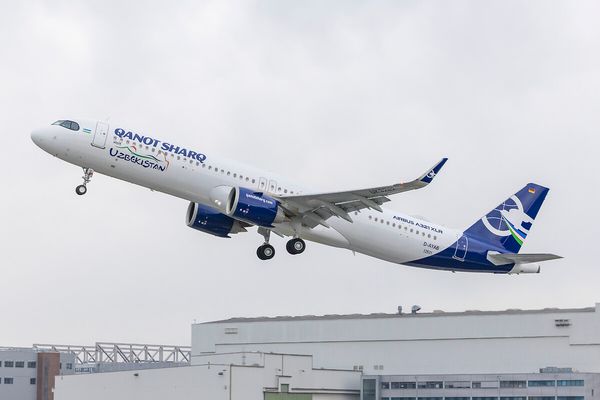Turkish Airlines, the world's most connected airline, recently confirmed a huge new order for 220 Airbus aircraft, following two smaller ones placed by the airline earlier in 2023. This mammoth order brings the Turkish flag carrier's total Airbus backlog to nearly 300 aircraft, in addition to the over 200 Airbus jets currently operated by the airline.

Let's examine this rather significant order and explore what changes it will bring to the Turkish Airlines fleet in the coming years.
More Airbus Jets
Turkish's most recent Airbus order, placed on December 15, consists of 220 aircraft. Broken down, these 220 planes consist of 150 Airbus A321neo and 70 A350s. Furthermore, the order for 70 Airbus A350s consists of 50 A350-900s, 15 A350-1000s, and five new and upcoming A350 Freighters. This 220-strong order follows two previous A350 orders made by the airline. In September 2023, Turkish ordered ten A350-900s, preceded by a smaller order for four planes in July.

Turkish operates 16 A350-900s, of which six were initially destined for Russian flag carrier Aeroflot. Due to sanctions placed on Russian airlines, Aeroflot was prohibited from taking delivery of those aircraft. As such, Turkish was able to take some of those planes and, in the process, retained the original Aeroflot cabins on some of the aircraft.
Returning to the Airbus order, Turkish Airlines Chairman of the Board and Executive Committee, Prof. Dr. Ahmet Bolat, sees this as more than a fleet expansion. The order is "a testament to [Turkish Airlines'] dedication to innovation, operational excellence, and a sustainable future."

The Chairman went on to say that:
"The addition of these advanced Airbus aircraft to our fleet will not only enhance our operational capabilities but also significantly contribute to our environmental goals. This investment is a crucial milestone in the future evolution of Türkiye's aviation industry. By modernizing our fleet with more efficient and environmentally friendly aircraft, we are reinforcing our leading position in global aviation and contributing to the nation's prominence as an aviation hub."
Dr. Bolat points out that these new Airbus aircraft are helping Turkish achieve its environmentally friendly goals. Both the A321neo and A350 boast significant noise reduction capabilities over their predecessors. Also, the A321neo offers up to 20% in fuel savings and CO2 reduction. The A350, furthermore, delivers up to a 25% advantage in fuel burn.

Turkish's choice of the Airbus A350F is worth noting as well. According to Airbus, this aircraft features the largest main deck cargo door of any cargo aircraft. The A350F also boasts a 20% lower fuel burn than its closest competitor, which can be assumed to be the Boeing 777F.
Turkish Fleet Outlook
While Turkish has not outlined any specific fleet replacement plans, it can be assumed that this massive order is partly meant to replace older aircraft and grow the fleet even further. Though this is only speculation, the gigantic A321neo order aims to replace Turkish's older A319, A320, and even some older 737NG aircraft.

With all options considered, Turkish has over 70 A350-900s on order in addition to 15 A350-1000s. Regarding older widebody jets, the airline operates 49 Airbus A330s (13 A330-200s and 36 A330-300s) and 33 Boeing 777-300ERs. The airline has noted that older A330 jets, most of which are leased, will gradually be returned to their lessors.
The A350-900 boasts significantly more capacity than the A330-200 and A330-300, so it is a bit outlandish to conclude that Turkish will exclusively use the new A350s to replace the A330s. Turkish's oldest 777-300ER, TC-JJE, is also just 13 years old, with the overall 777-300ER fleet being 9.4 years old on average, according to data from Planespotters.net.

In short, this doesn't spell any upcoming replacements for the 777 fleet either. The Turkish Airlines fleet (Turkish Cargo included) stands at 439 planes, with a total backlog of 314 aircraft. Such a huge fleet expansion will further assist Turkish in growing its global reach.
The airline currently serves 126 countries, more than any other airline, and flies to more nonstop destinations than anyone else as an addition. With such a large fleet and even more planes to come, Turkish Airlines looks to be fully set on maintaining its position as the largest mainline carrier in the world by passenger destinations.
Should Students Have Homework? Better After-School Balance » JetBlue Opens First-Ever ‘BlueHouse’ Lounge at JFK Terminal 5 » EASA Mandates Airbus A320 Fuselage Inspections »
Comments (0)
Add Your Comment
SHARE
TAGS
NEWS Turkish Airlines Turkey Airbus Aircraft Order A321 A350 A321neo FleetRECENTLY PUBLISHED
 Should Students Have Homework? Better After-School Balance
Is homework bad for students? Explore learning benefits, stress, sleep, and smarter workload limits, so after-school time stays balanced.
STORIES
READ MORE »
Should Students Have Homework? Better After-School Balance
Is homework bad for students? Explore learning benefits, stress, sleep, and smarter workload limits, so after-school time stays balanced.
STORIES
READ MORE »
 Air Canada Rouge to Launch Boeing 737 MAX 8 Operations
Air Canada has officially confirmed a strategic shift for its leisure subsidiary, Air Canada Rouge, announcing that Boeing 737-8 (MAX 8) operations are slated to begin in late Q1 2026. The move marks the beginning of an ambitious year-long transition that will see Rouge evolve into an all-Boeing 737 operator.
ROUTES
READ MORE »
Air Canada Rouge to Launch Boeing 737 MAX 8 Operations
Air Canada has officially confirmed a strategic shift for its leisure subsidiary, Air Canada Rouge, announcing that Boeing 737-8 (MAX 8) operations are slated to begin in late Q1 2026. The move marks the beginning of an ambitious year-long transition that will see Rouge evolve into an all-Boeing 737 operator.
ROUTES
READ MORE »
 Qanot Sharq Takes Delivery of First Airbus A321XLR to Transform Central Asian Long Haul Travel
Uzbekistan’s premier private carrier, Qanot Sharq, has officially taken delivery of its first Airbus A321XLR. The delivery, which took place today at the Airbus facility in Hamburg, makes Qanot Sharq the launch operator for the ultra-long-range narrow-body in the Commonwealth of Independent States (CIS) and Central Asia.
ROUTES
READ MORE »
Qanot Sharq Takes Delivery of First Airbus A321XLR to Transform Central Asian Long Haul Travel
Uzbekistan’s premier private carrier, Qanot Sharq, has officially taken delivery of its first Airbus A321XLR. The delivery, which took place today at the Airbus facility in Hamburg, makes Qanot Sharq the launch operator for the ultra-long-range narrow-body in the Commonwealth of Independent States (CIS) and Central Asia.
ROUTES
READ MORE »



